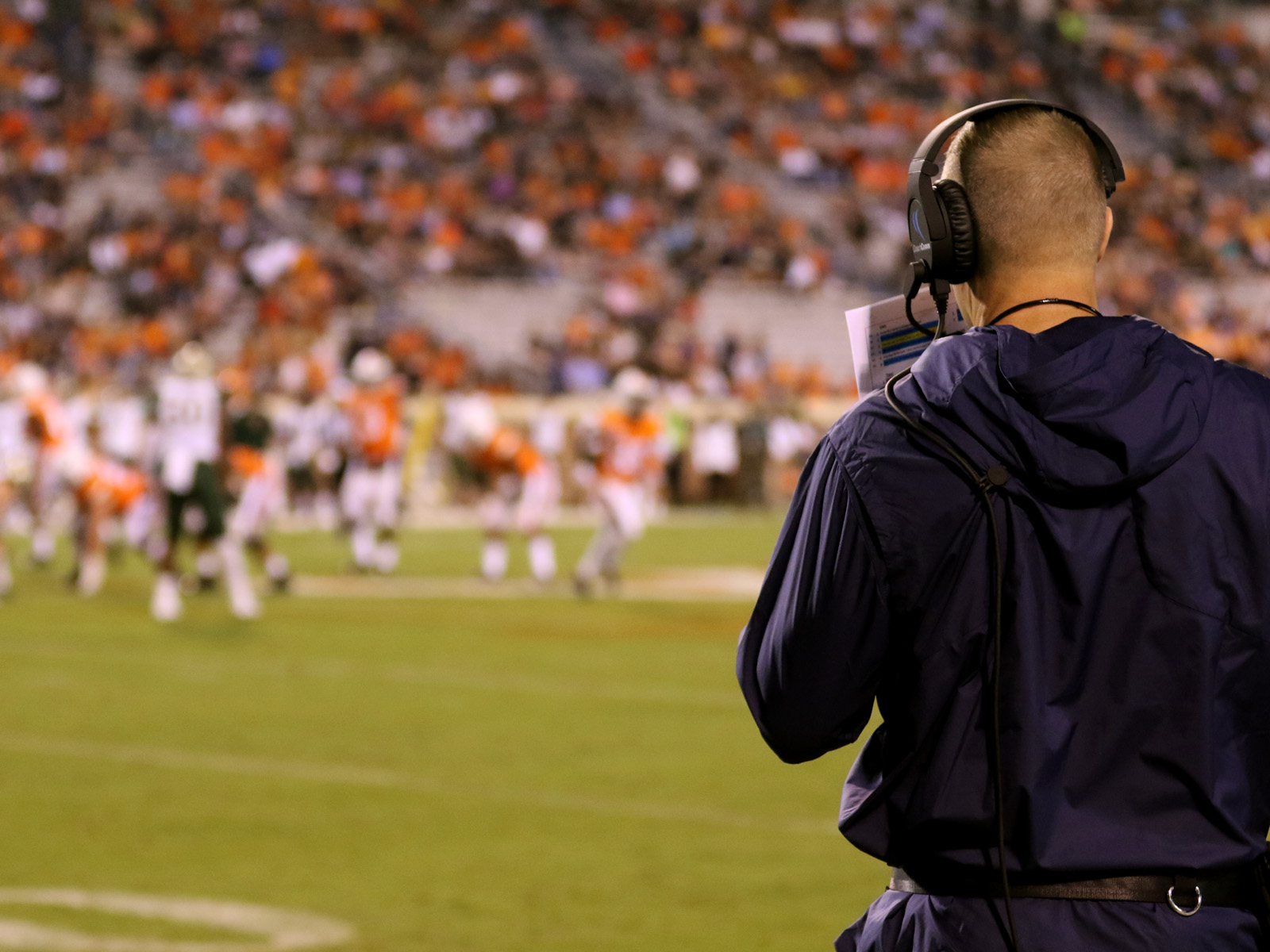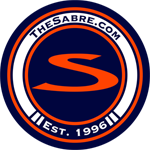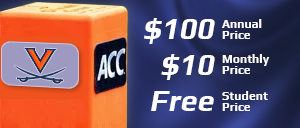
Virginia football coach Bronco Mendenhall likes to plan. He’s a meticulous planner in fact. He keeps binders full of situational information from previous seasons, those games, and those practices for future reference. He outlines every practice with a specific goal in mind for a specified amount of time. Mendenhall often speaks of succession planning at each position.
So, yes, the fifth-year Cavalier coach is planner. There was no plan for this, though.
As the coronavirus outbreak for COVID-19 spread in the United States and grew more concerning, the landscape for sports changed rapidly. It moved from events would continue to events would continue with limited access to non-participants to some events cancelled to nearly all events cancelled nation-wide in a matter of days. Colleges and universities also began to close classrooms and move to online teaching, which included UVA. President Jim Ryan strongly requested that all students return to their homes after spring break and not Charlottesville.
The NCAA and its member institutions soon decided to cancel all sports activities, including practices, not long after the competitions were axed. That meant football programs that had yet to conduct spring practice lost their opportunity. That included Virginia, which was scheduled to open spring practice on March 24.
Any plans Mendenhall had in place officially hit the recycling bin. He and his staff quickly had to shift into student-athlete welfare mode first and then into long-term planning mode next. Mendenhall now frames things with two catch phrases of sorts: as if and what if.
“We’re meeting. Myself and my entire staff are working remotely,” Mendenhall said on a video conference for the media Thursday. “We have staff meetings as if we’re working in normal conditions. We’ve done the same thing with our players. They have a schedule that is sent out to them as if they were still at UVA, meaning a wake-up time, their nutrition time, their workout time, their meeting times with academic coordinators, with mentors, with learning specialists, when their class times are. We’re adding a structure to make this as normal as possible. Basically wherever they’ve gone to, we’ve created the same structure for them as if it were here knowing there are some limitations to that.”
The coaches cannot run drills from afar through technology. They can’t run group film sessions through video meeting software or anything like that. Since the program is not in a practice period, the compliance rules match out-of-season timing for the foreseeable future even when the would-be practice period would have opened next Tuesday for the Hoos. The program is permitted to send workout details, nutrition plans, and things like that, but they can’t run the workouts themselves.
Coaches are allowed, per Mendenhall, to continue their usual communication with players. That means individual meetings via technology are permitted, but the conversations must stick to non-football topics other than checking in on their nutrition and health.
“The coaches can meet with the players virtually or online, but there [are restrictions] on what we can actually talk about,” Mendenhall said. “We are not currently in spring practice so we can’t be presenting and doing online meetings for football because that would be outside the parameters of what normal compliance [rules] would look like since this hasn’t been deemed spring practice. We can communicate to them on health, on well-being, on academics, on nutrition, on social choices, on their conditioning, on their housing, on things that are relationship driven and well-being driven. Things can be forwarded to them in terms of study, but there can’t be any back-and-forth instructions in regards to football.”
Sending out the allowable workout and nutrition packages isn’t as simple as sending an email, though. With the players scattered throughout the country – only approximately 5 players remain in Charlottesville, Mendenhall said, due to health or safety type concerns if they were to return home – the strength and conditioning staff has had to create new workout plans and guidance packets. The weight room at UVA is closed currently so in order to put things together, the strength and performance staff has shifted to Coach Mendenhall’s home instead.
Working out of his pool house on a property covering nearly 30 acres, the staff is coming up with those new details for players. Those coaches know that gyms around the country are also closing so that means also adjusting things for in-home workouts. Mendenhall indicated that coaches weren’t sitting elbow to elbow in this new work space.
“With the correct social distancing, my strength and conditioning staff – I have a pool house here on my property – they’re meeting diligently regarding that,” Mendenhall said. “… Our coaches, we have a protocol now that’s daily between all position coaches and their players, it’s built in where there’s daily check-in regarding their health, regarding their safety, regarding their nutrition, and regarding their training. Knowing now that many gyms have closed, we’re designing programs that require no equipment in isolation. A lot of body weight type of exercises, a lot of things where you’re looking around your house for what do you have that weighs anything and how can you design workouts.”
The strength and conditioning planning, of course, has no known endpoint right now. Once the end of the semester arrives, the coaches don’t know currently what summer sessions, if they’re allowed, will look like. They don’t know, for example, if restrictions are lifted, if the ACC or NCAA will allow those programs that missed spring practice to have a limited session in the summer at some point. They don’t know if the NCAA will start fall camp at the expected date.
Mendenhall even said there’s no certainty that football season will take place at all. He’s taking every potential end point and working backward essentially to make sure there is a potential plan in place no matter what decisions are made down the road. That’s where the as if and what if approach kicks in again.
“We’re acting as if and we’re making preparations as if we won’t have spring practice, we possibly won’t have players here for summer school – any session – and possibly we won’t have the opportunity for anything other than fall camp to begin and knowing that fall camp timing might even be pushed back. There certainly could be a chance that it’s not even a full schedule played this year if football is played period,” Mendenhall said. “So I’m willing to expand and look at that vision as far as possible saying what if there’s no football this season? Or what if there’s a modified season? Or what if all we can do is start in fall camp? So we’re making preparations as best we can for any and all of those scenarios, including if players can arrive in summer at any point in time.”
Mendenhall called it “an amazing challenge” to try to figure out all the scenarios and moving pieces to try to guide the program through this outbreak. Of course, part of that challenge is to try to empower the players to take control of their own situations and workouts outside of UVA. The coaches can check in on “almost Maslow’s heirarchy of needs” like safety and nutrition and provide some guidance for the players from far away. They can’t, however, monitor each choice the players make.
That’s where the program’s culture and player leadership will have to kick in as well as individual accountability.
“My sincere hope is the daily interactions and the daily engagement with our players and what they’ve learned has been preparing them for going off into the real world,” Mendenhall said. “So this is now a test, not the same, but as if they were married, as if they go off to get their first job, as if they’re entering the workplace or possibly even going to the NFL. … Will the lessons we’ve presented, will the habits that we’ve hopefully ingrained, will the principles that govern their choices, will all of those hold enough to help them with less structure to keep on a similar trajectory to what they were when they’re with us?”
The program steward duties go beyond the current players too. Recruiting the next generation of players must continue even though all off-campus recruiting and all on-campus visits have been suspended. That outreach falls fully into the digital and virtual world, even more so than the typical social media work that is ongoing in programs around the country.
Virginia, like other institutions, has worked to create ways for prospects to see the University through technology. They’re also setting up daily pockets of time to interact with recruits through phone calls, video calls, and the like. For Mendenhall, that means setting aside time for those calls from 3 to 5 and 7 to 9 each day.
“We’re maximizing those and then trying to create as many virtual things as possible for those that haven’t visited Grounds so they can see Grounds and be interactive with them without actually experiencing them in person,” Mendenhall said. “Timeframes are different as well. This really is a challenge for the graduate transfers that are still looking for places. … The grad transfer population is probably one that’s been effected most immediately, but that doesn’t mean every other isn’t being effected. The amount of content that is being pushed through edits, video, and through every possible means. I keep using the words ‘as if’- to have players have a similar experience as if they were on Grounds or as if we were in their homes. All of those things are what our intent is.”
None of this adapted plan is taking place at the Virginia football offices at the McCue Center. As Mendenhall mentioned above, the UVA coaching staff is all working remotely. Running backs coach Mark Atuaia Tweeted out a collage of the coaches in their respective spaces earlier this week.
Mendenhall’s at-home office is located in the pool house where he has multiple computers and a big projection screen. He indicated that his setup there features exactly the same things as his space at McCue. He’s also outlined a daily schedule for himself to follow, much like the program sent out to the players for their remote locations. He begins the day at 8 a.m., eats lunch and gets in a workout from 12-2, leads a remote staff meeting from 2-3, and holds those recruiting calls from 3 to 5 and 7 to 9.
In between the recruiting sessions, he spends time with his three sons, who all are at home at this time. That means throwing on some cowboy clothes and heading out to the rodeo roping arena on the family property known affectionately by the family as HB3 for Holly, Bronco, and the three sons.
Repeat that outline each day.
“I have my own structure,” Mendenhall said. “The commute to the pool house isn’t the same as the 12-minute commute to McCue based on if the dogs are in the way or if any leaves have blown on the patio between my back door and the pool house. It’s one minute from my bedroom to the pool house. So my commute now is very efficient. I usually stop and get a green smoothie in the kitchen on the way. That’s about a four-minute time frame to make it from bed to the pool house.”



